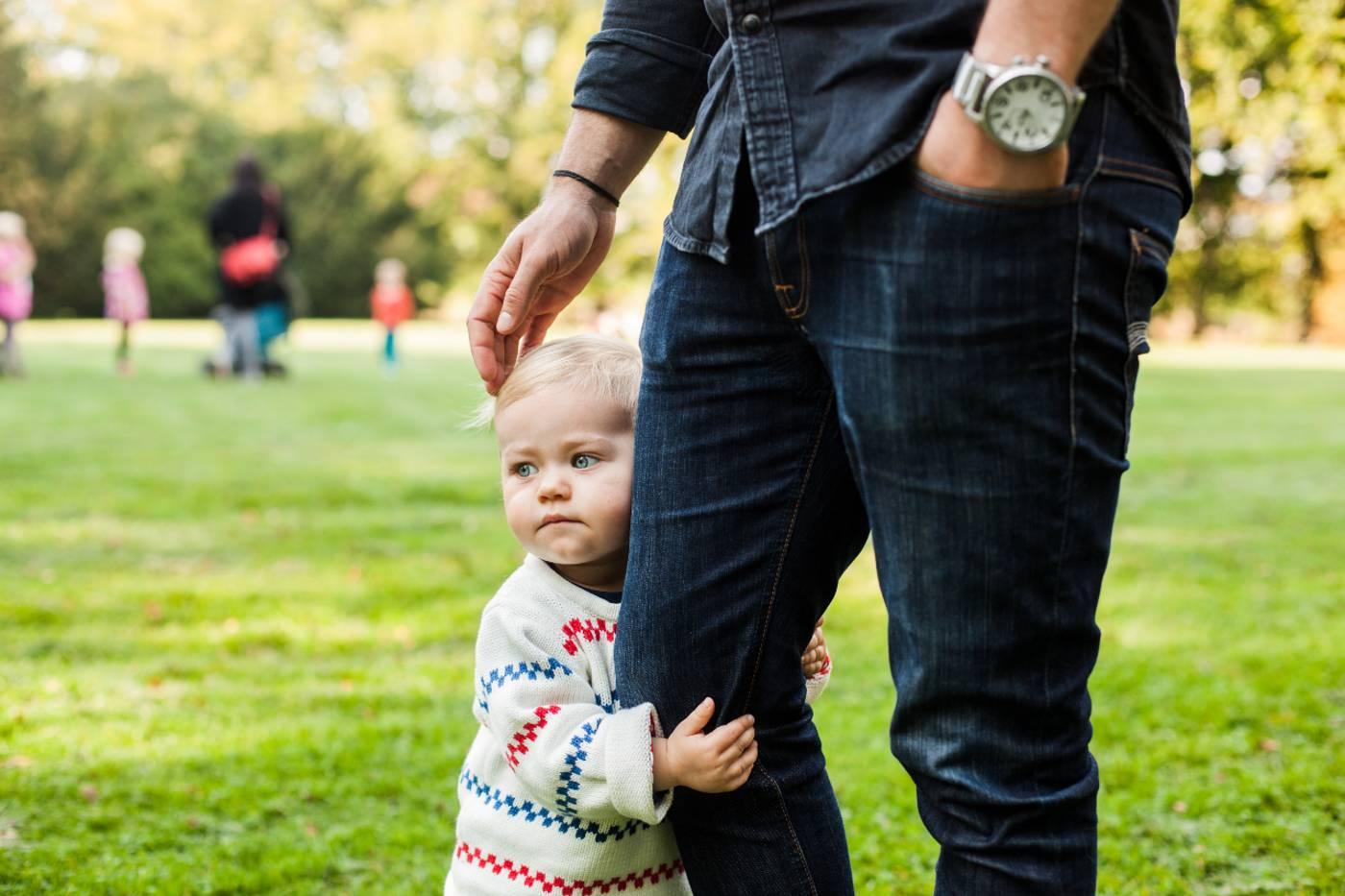TODDLER
Help! My Toddler Has a Favorite Parent
Is your toddler playing favorites? Here’s how to handle parent preference.

Written by
Happiest Baby Staff

Chances are you have a favorite food, a favorite show, and a favorite pair of cozy PJs. No biggie, right? But when your toddler suddenly declares a favorite parent, well, that hits a little different. Frankly, it hurts!
If you’re knee-deep in an “I want Daddy” or “Only Mommy!” phase, take heart: It’s very common for toddlers to prefer one parent to the other—and parent preference is often temporary. Whether you’re the preferred parent—or the dejected second-choice—here’s the help you need to expertly navigate your toddler playing favorites.
Is it normal for toddlers to have a favorite parent?
Yes! Having a favorite parent is a normal part of childhood development that usually occurs when a toddler becomes more independent and learns to better express their opinions, which is generally between 1 and 3 years old, according to experts at KinderCare, America’s largest provider of early education and childcare. (You’ll also notice your tot exhibits preferences for a lot of things, like colors, clothes, and foods. Hello picky eating!)
It’s also normal for your toddler or preschooler to change their parent preferences. So, no matter who’s currently crowned Most Favorite Parent in your household, know that favoritism does not mean your child loves one parent more than the other.
Why Your Child Shows Parental Preference
There is no one-size-fits all explanation as to why your toddler may temporarily prefer you over your partner—or vice versa. However, there are several reasons kids play favorites with their parents, including:
-
One parent is around more. Research suggests that when toddlers are upset and crave comfort, they prefer the caregiver who they spend the most time with. - They miss you. Alternatively, your toddler may crave closeness with the parent who is not home with them during the day, so they stick to them like glue when they’re home.
- Toddlers crave routine. “For toddlers, predictable routines lower stress, increase confidence, and give them a sense of security,” says pediatrician Dr. Harvey Karp, author of bestselling The Happiest Baby on the Block. So, when you shake up that routine with, say, your partner putting your toddler to bed instead of you, you can get an earful of “NO! I want Mommy!”
- Toddlers are flexing their power. Toddlers are known for digging in their heels. It’s how they start to exert their independence…which is ultimately a good thing—even if it doesn’t feel that way when they’re bellowing, “I don’t want you, Mama!”
- You’ve got similar temperaments. Sometimes a toddler aligns themselves with a particular caregiver simply because their temperament is similar. (Dr. Karp walks you through different toddler temperaments.)
- There’s “good cop, bad cop” parenting dynamic. Your toddler is no dummy! If one parent is a big softy and perhaps a little looser with the rules, they may cozy up to them, declaring the permissive parent is their favorite.
How to Deal With Your Child’s Parental Preference
Whether you’re the top dog in your toddler’s eye or in the doghouse, there are effective strategies to help you navigate either side of the parental preference spectrum:
-
Offer options. All toddlers struggle with feeling like they have no control, so it’s important to give them choices and ask for their opinions whenever you can. “Starting at age 2, your tot will love being asked to make choices,” says Dr. Karp. “It shows them that you think they’re smart and you have confidence in their choices.” When they’re allowed to choose their bedtime story, their oatmeal toppings, whether you go to the playground or the petting zoo, and so on, they’re less primed to choose a power struggle based on a preferred parent. - Have a plan. You and your partner need to work together to devise clear rules and boundaries and then stick to them. For example, if your toddler is struggling with one parent’s involvement with bedtime, set up a predictable schedule. Maybe Monday, Wednesday and Friday are your nights to do bedtime, and Tuesday, Thursday and Saturday are your partner’s nights. Then on Sunday, make it’s kid’s choice. (It may also help to use a calendar with visual cues, noting who’s on bedtime duty when.)
- Both parents need to know what’s up. When one parent is the Knower of All Things, it shifts the power dynamic, priming your tot to favor the one who appears to be in charge. To side-step this, read all about dividing the mental load and create a partnership with your co-parent to ensure you’re in sync regarding basic info around daily routines, including meals, sleep schedules, and more. Plus, this way you can say with confidence things like, “Mommy is perfectly capable of giving you a bath” or “Of course Daddy knows how to buckle the car seat.”
Tips for the Preferred Parent
-
Include the out-of-favor parent. When your tot shuns your partner, don’t do the same! Instead, include them in as many of your toddler interactions as you can. If your toddler insists you’re the only one who can play blocks with them, tell them that you’ll help build, but Daddy is going to help sort the blocks. - Be positive! Whenever you’re talking to the non-favorite parent in front of your tot, use a friendly tone and say only positive things. Doing this shows your kiddo that your partner deserves respect and kindness.
- Offload some fun! Give your partner a turn to shine the good-time-Charlie spotlight on themselves. Encourage them to take charge of some of the activities your toddler looks forward to, like weekend bike rides, storytime at the library, or putting the chocolate chips into the pancake batter.
- Get out of the house. It’s easier for the non-preferred parent to win favor when you make yourself scarce. That could simply mean regularly planning a solo errand when it’s time to serve your toddler lunch or happy hour cocktails with pals on Thursdays, so your partner can tackle dinner and bedtime solo. Bonus: Your toddler will likely come to love their special one-on-one time with the other parent!
- Defer! When your toddler is in full favorite-mode, make a point to sometimes defer to your partner when you tot asks questions or asks for something. If your toddler asks, “Daddy, why do kitties have whiskers?” Say, “I’m pretty sure Mommy knows the answer. Go ask her!”
- Don’t save the day. When your tot is upset, step back and allow the non-favorite parent to take the comforting lead. (It’s smart to review the ins-and-outs of Toddler-ese together first.) This not only builds the non-favorite parent’s confidence, it shows your child that you have confidence in their ability to help, too.
Tips for the Unpreferred Parent
-
Don’t take it personally. “When we get mad or hurt when our tot says something like ‘I don’t want Mommy! I want Daddy!’, our rational left brain shuts down and the emotional right side takes over,” says Dr. Karp. “That’s why, in the heat of the moment, it’s easy to forget that your toddler isn’t intentionally trying to hurt or humiliate you.” - Quell the hurt feelings. When you act like you’re sad or angry about your toddler’s rejection, you’re actually giving them more power…which can be a vicious cycle. Next time you’re hit with a, “NO! Daddy instead!” keep the you-hurt-my-feelings speech to yourself. Instead, try, “I know you love it when Daddy takes you to school, but I love to take you to school, too. This morning it’s my turn, and it’s Daddy’s turn again tomorrow.”
- Keep engaging! It’s super frustrating when your toddler continues to reject you but resist your instinct to shrink away. Withdrawing only reinforces the notions that you’re not interested in being there for your child.
- Express understanding. Bust out the Toddler-ese, which is your toddler’s native tongue (short phrases and repetition) with you mirroring about one-third of your child’s feelings with your tone of voice and gestures. This style of talking “works wonders for helping a toddler feel cared about and understood,” says Dr. Karp. Try “You’re mad! Mad! Mad! You want Daddy! You love Daddy so much!” Once your toddler is allowed to express how they feel—and you acknowledge their feelings—they’re better equipped to listen to you.
- Express your love. If your toddler pushes away your hugs and kisses, don’t let that deter you from expressing your feelings. While you should not force your child to show you affection, you should continue to tell your tot that you love them.
- Look for one-on-one opportunities. Brainstorm some new ways you and your toddler can spend time together—and then schedule it into your routine. For example, start taking your tot to the farmer’s market every Saturday or declare Tea Party Fridays where you always bring a special treat to share over pretend tea.
Bottom Line on Parent Preference
Remember that this is normal, temporary, and it can even be thought of as a good thing! When your toddler feels super-safe and connected with a parent, it’s reassuring. That temporary favoritism means the other parent can take a much-needed break! On the flip side, when your toddler feels comfortable enough to (temporarily) reject a parent, that means they know the love is unconditional. (If your toddler was unsure of a parent’s love, they’d likely scramble for their attention.)
More Insights on Toddler Behavior:
- Dr. Harvey Karp on Stopping Toddler Defiance
- How “Kind Ignoring” Curbs Annoying Toddler Behavior
- When Do Toddlers Learn to Share?
- What to Expect From Your Tot’s Attention Span
Disclaimer: The information on our site is NOT medical advice for any specific person or condition. It is only meant as general information. If you have any medical questions and concerns about your child or yourself, please contact your health provider.
SHARE THIS ARTICLE
MOST LOVED
Sleepytime Sidekicks












